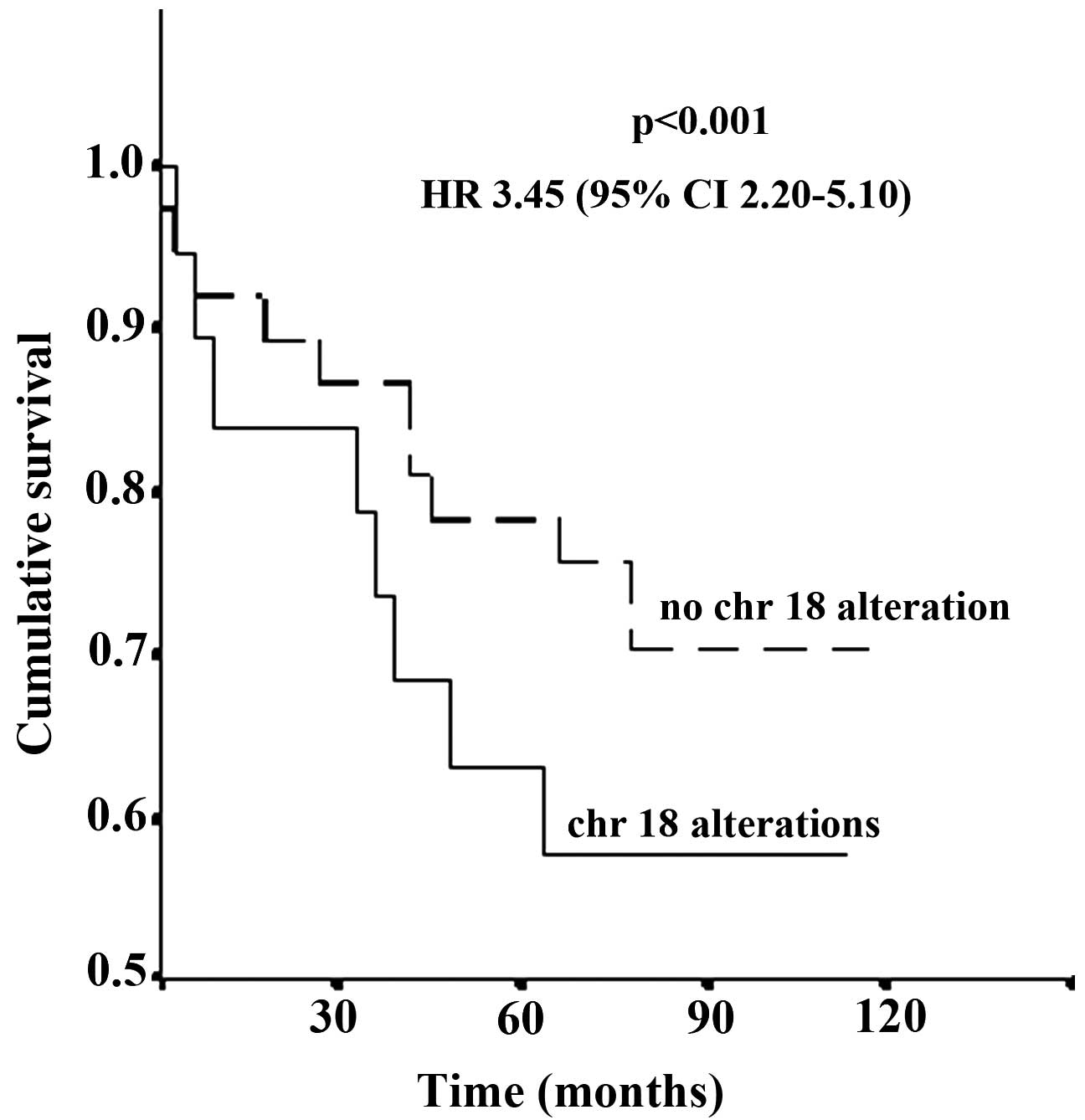|
1
|
Jemal A, Siegel R, Ward E, et al: Cancer
statistics, 2007. CA Cancer J Clin. 57:43–66. 2007. View Article : Google Scholar : PubMed/NCBI
|
|
2
|
MhawechFauceglia P, Cheney RT and
Schwaller J: Genetic alterations in urothelial bladder carcinoma:
An updated review. Cancer. 106:1205–1216. 2006. View Article : Google Scholar : PubMed/NCBI
|
|
3
|
Tomasini JM and Konety BR: Urinary
markers/cytology: What and when should a urologist use. Urol Clin
North Am. 40:165–173. 2013. View Article : Google Scholar : PubMed/NCBI
|
|
4
|
Cai T, Nesi G, Dal Canto M, Mondaini N,
Piazzini M and Bartoletti R: Prognostic role of loss of
heterozygosity on chromosome 18 in patients with low-risk
nonmuscle-invasive bladder cancer: Results from a prospective
study. J Surg Res. 161:89–94. 2010. View Article : Google Scholar : PubMed/NCBI
|
|
5
|
Bartoletti R, Cai T, Nesi G, Roberta
Girardi L, Baroni G and Dal Canto M: Loss of P16 expression and
chromosome 9p21 LOH in predicting outcome of patients affected by
superficial bladder cancer. J Surg Res. 143:422–427. 2007.
View Article : Google Scholar : PubMed/NCBI
|
|
6
|
Bartoletti R, Cai T, Dal Canto M, Boddi V,
Nesi G and Piazzini M: Multiplex polymerase chain reaction for
microsatellite analysis of urine sediment cells: A rapid and
inexpensive method for diagnosing and monitoring superficial
transitional bladder cell carcinoma. J Urol. 175:2032–2037. 2006.
View Article : Google Scholar : PubMed/NCBI
|
|
7
|
Knowles MA: What we could do now:
Molecular pathology of bladder cancer. Mol Pathol. 54:215–221.
2001. View Article : Google Scholar : PubMed/NCBI
|
|
8
|
Uchida A, Tachibana M, Miyakawa A,
Nakamura K and Murai M: Microsatellite analysis in multiple
chromosomal regions as a prognostic indicator of primary bladder
cancer. Urol Res. 28:297–303. 2000. View Article : Google Scholar : PubMed/NCBI
|
|
9
|
Switula D: Principles of good clinical
practice (GCP) in clinical research. Sci Eng Ethics. 6:71–77. 2000.
View Article : Google Scholar : PubMed/NCBI
|
|
10
|
Polymeropoulos MH, Xiao H and Merril CR:
Tetranucleotide repeat polymorphism at the human myelin basic
protein gene (MBP). Hum Mol Genet. 1:6581992. View Article : Google Scholar : PubMed/NCBI
|
|
11
|
Bartoletti R, Dal Canto M, Cai T, Piazzini
M, Travaglini F, Gavazzi A and Rizzo M: Early diagnosis and
monitoring of superficial transitional cell carcinoma by
microsatellite analysis on urine sediment. Oncol Rep. 13:531–537.
2005.PubMed/NCBI
|
|
12
|
DalCanto M, Bartoletti R, Travaglini F,
Piazzini M, Lodovichi G, Rizzo M and Selli C: Molecular urinary
sediment analysis in patients with transitional cell bladder
carcinoma. Anticancer Res. 23:5095–5100. 2003.PubMed/NCBI
|
|
13
|
Edge SB, Byrd DR, Compton CC, et al:
American Joint Committee on Cancer Staging Manual. 7th. Springer;
New York, NY: pp. 117–126. 2010
|
|
14
|
Eble JN, Sauter G, Epstein JI and
Sesterhenn IA: World Health Organization Classification of Tumours:
Pathology and Genetics of Tumours of the Urinary System and Male
Genital Organs. IARC Press; Lyon, France: pp. 89–154. 2004
|
|
15
|
Gakis G, Efstathiou J, Lerner SP, et al:
International Consultation on Urologic Disease-European Association
of Urology Consultation on Bladder Cancer 2012: ICUD-EAU
International Consultation on Bladder Cancer 2012: Radical
cystectomy and bladder preservation for muscle-invasive urothelial
carcinoma of the bladder. Eur Urol. 63:45–57. 2013. View Article : Google Scholar : PubMed/NCBI
|
|
16
|
Stenzl A, Cowan NC, De Santis M, Kuczyk
MA, Merseburger AS, Ribal MJ, Sherif A and Witjes JA: European
Association of Urology (EAU): Treatment of muscle-invasive and
metastatic bladder cancer: Update of the EAU guidelines. Eur Urol.
59:1009–1018. 2011. View Article : Google Scholar : PubMed/NCBI
|
|
17
|
Cai T, Conti G, Lorenzini M and Bartoletti
R: Artificial intelligences in urological practice: The key to
success? Ann Oncol. 18:6042007. View Article : Google Scholar : PubMed/NCBI
|
|
18
|
Cai T, Conti G, Nesi G, et al: Artificial
intelligence for predicting recurrence-free probability of
noninvasive high-grade urothelial bladder cell carcinoma. Oncol
Rep. 18:959–964. 2007.PubMed/NCBI
|
|
19
|
Lee SE and Park MS: Prognostic factors for
survival in patients with transitional cell carcinoma of the
bladder: Evaluation by histopathologic grade, pathologic stage and
flow-cytometric analysis. Eur Urol. 29:193–198. 1996.PubMed/NCBI
|
|
20
|
GarciaClosas M, Ye Y, Rothman N, Figueroa
JD, Malats N, Dinney CP, Chatterjee N, Prokunina Olsson L, Wang Z,
Lin J, et al: A genome-wide association study of bladder cancer
identifies a new susceptibility locus within SLC14A1, a urea
transporter gene on chromosome 18q12.3. Hum Mol Genet.
20:4282–4289. 2011. View Article : Google Scholar : PubMed/NCBI
|
|
21
|
Koutros S, Baris D, Fischer A, et al:
Differential urinary specific gravity as a molecular phenotype of
the bladder cancer genetic association in the urea transporter
gene, SLC14A1. Int J Cancer. 133:3008–3013. 2013.PubMed/NCBI
|
|
22
|
Brewster SF, Gingell JC, Browne S and
Brown KW: Loss of heterozygosity on chromosome 18q is associated
with muscle-invasive transitional cell carcinoma of the bladder. Br
J Cancer. 70:697–700. 1994. View Article : Google Scholar : PubMed/NCBI
|















